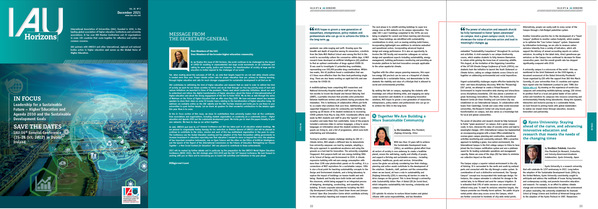Insight@ZJU: Vice President HE Lianzhen shares her vision for building a more sustainable community
[Message from the Editor: In the face of major challenges, concerted actions need to be taken more broadly in order to achieve the Sustainable Development Goals (SDGs) by 2030. Innovation-driven universities have a greater responsibility to shoulder and a unique role to play in this process. At the invitation of International Association of Universities (IAU), Vice President HE Lianzhen shared ZJU’s practice in sustainability in the newly released issue of IAU Horizons.]

Together We Are Building a More Sustainable Community
With less than 10 years left to achieve the Sustainable Development Goals (SDGs), an ambitious global effort from all sectors of society is now underway to create a healthier planet, ensure the well-being, equity and vitality of people, and support a thriving and sustainable economy - including education, healthcare, goods and services. Universities across the globe are actively considering how their strategy, planning and action would contribute to the development of the solutions. Students, staff, partners and the communities where we are based, all have a role in sustainability and Zhejiang University (ZJU) is removing all barriers in order to drive changes on the ground. This is done through a university-wide Sustainability Action Plan: A Global ZJU for Social Good, which integrates sustainability into learning, scholarship and campus operations.
ZJU upholds its mission to nurture future leaders and global citizens with social responsibilities, and has therefore embedded “Sustainability Competence” throughout its curricula and activities. A vivid example is our unique biodiversity course, which enables students to fully immerse themselvesin nature while gaining the know-how of conserving wildlife. This August, at the invitation of the Organizing Committee of the 16th UN Climate Change Conference of Youth (COY16), our students took the initiative to launch the Youth Statement on Climate Action, calling on college students across China to act together on addressing environmental and social imperatives.
Urgent sustainability challenges require effective leadership for inter- and trans-disciplinary discovery. With the “Research@ZJU” portal, we attempt to create a Virtual Research Environment to inspire innovative data sharing and interactions across disciplinary boundaries. ZJU also places a premium on green technology innovations. This March, the International Research Center for Green Building and Low-Carbon City was established on our International Campus. In collaboration with teams from Cambridge, Cornell and some other world-renowned universities, the Research Center not only boosts green transformation on campus, but also serves as a knowledge hub for local and global communities.
The power of education and research should be fully harnessed to foster “green awareness” on campus. And a green campus could, in turn, showcase the value of concrete action and lead to meaningful changes. ZJU’s International Campus has implemented an emcompassing program with a Green Office established to oversee green campus planning and construction, operational activities monitoring and community outreach. With a proactive approach to building a green, low-carbon environment, the International Campus is the first college campus in China to have joined the Eco-Campus certification system and won a platinum award for its leading sustainable operations and management capacity. Below are some of the steps ZJU has taken to minimize our collective impact on the earth.
The Campus enjoys a superior natural environment in the city of Haining. It is surrounded to the north and south by wetland parks and connected with the city through a water system. In consideration of such a distinctive environment, the “Sponge Campus” concept was incorporated into landscape design. For instance, the campus rainwater is collected for storage in the central lake, to be filtered and used for campus irrigation. It is estimated that 15% of water resources are conserved and utilized every year. To meet its emission reduction targets, the Campus promotes eco-friendly travel options. Ten public bicycle rental points allow easy access across the Campus, which are further connected to hundreds of city-wide rental points. Alternatively, people can easily walk to every corner of the Campus through a full-fledged pedestrian system.
Another innovative practice lies inthe development of a “Smart Campus” platform to monitor carbon footprint, which enables us to optimize the “Low Carbon Campus” system. Empowered by information technology, we are able to measure carbon emission intensity from a variety of indicators, which will support the delivery of annual accounting reports on carbon emissions. According to the latest data, direct greenhouse gas emissions on the Campus have continued to decrease for three consecutive years. And the overall growth rate has dropped significantly compared with 2019.
A university campus is a microcosm of the world – this was mentioned in the Joint Statement on the 2030 Agenda, a document announced at the Global University Presidents’ Forum organized by ZJU with the support from IAU this March. Currently, 61 peer universities from 31 countries and regions have signed onto the Statement (contact to join : TONG Jun: tj@zju.edu.cn). By drawing on the experience of world-class campuses and unleashing multidisciplinary synergy, ZJU strives to position itself as a local and global leader of low-carbon action and transform its campuses into resource-conserving and environmentally friendly living laboratories. Along this dynamic, interactive and inclusive journey to a sustainable future, we look forward to joining hands with global stakeholders to realize our shared vision through education, research, innovation and partnership.